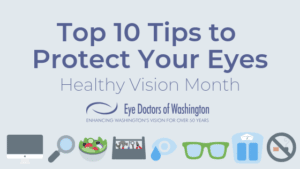Our Top 10 Tips to Protect Your Eyes
Did you know May is Healthy Vision Month?
To help you keep your eyes healthy, we’ve put together our top ten tips for protecting your eyes.
Generally, you should have your eyes checked every 1 to 2 years, more often if you are at risk for developing eye conditions such as glaucoma.
But if you experience any warning signs like these, it’s absolutely time to schedule an appointment!
- Severe, sudden eye pain
- Recurrent pain in or around the eye
- Hazy, blurred, or double vision
- Seeing flashes of light or sudden bright floating spots
- Seeing rainbows or halos around lights
- Seeing floating “spider webs”
- Seeing a “curtain coming down” over one eye
- Sensing a “cup filling up with ink” in one eye
- Unusual, even painful, sensitivity to light or glare
- Swollen, red eyes
- Changes in the color of the iris
- White areas in the pupil of the eye
- Sudden development of persistent floaters
- Itching, burning, or a heavy discharge in the eyes
- Any sudden change in vision
Source: visionaware.org
Apart from watching out for troublesome eye symptoms, here are 10 ways you can protect your eyes!
1. Know Your Family History:
Studies show that myopia (nearsightedness), hyperopia (farsightedness), astigmatism, glaucoma, and age-related macular degeneration are linked to genetics, which is why it is so important for you to know your family’s history. If you are at risk for conditions such as glaucoma, your eye doctor may recommend that you come in more frequently.
2. Watch your Weight
Being at a healthy weight is good for many reasons, including the health of your eyes! Many people don’t know that obesity can put the health of their eyes in danger. Obesity has been linked to higher intraocular pressure, diabetic retinopathy, and the development of cataracts.
3. Eat for your Eye Health
Everyone knows eating healthy can help your waistline but it can also help to keep your eyes healthy. Nutrients like zinc, copper, vitamin C, vitamin E, and beta-carotene could reduce the risk of age related eye health decline by 25%. What does this mean? It means eating foods such as fish, nuts, seeds, leafy greens, carrots, beets, and sweet potatoes can help keep your eyes healthy over time.
4. Wear Sunglasses
The sun emits harmful UV rays even when it isn’t bright outside. That means sunglasses aren’t just for summer. They should be used to protect your eyes year round, especially when around water, sand, or snow. Sufferers of cataracts and macular degeneration should be extra careful, because they have a greater risk of eye damage from UV rays.
5. Stop Smoking
You’ve probably heard about a lot of ways that smoking can damage your health. So, here’s one more: smoking increases your chances of developing cataracts, glaucoma, age-related macular degeneration, diabetic retinopathy, and Dry Eye Syndrome.
Here are the facts:
Smokers are twice as likely to develop dry eye syndrome than non smokers.
Smokers are up to 3 times more likely to develop cataracts than non smokers.
Smokers are 3 to 4 times as likely to develop age-related macular degeneration.
So if you need a reason to quit, quit smoking for your eyes.
6. Practice proper contact care
One million Americans contract eye infections from improper contact use each year.
If you don’t follow the guidelines for taking care of your contacts, you could end up with a nasty infection, irritation, or even total vision loss. Be sure to follow your eye doctor’s instructions. Don’t sleep in your lenses, don’t expose them to water, and don’t use them past their shelf life. Don’t want to deal with the fuss of contacts? Schedule a LASIK consultation with us.
7. Follow the 20/20/20 rule at work
Most Americans sit at a computer for over 40 hours per week. Studies have shown that up to 90% of extensive computer users suffer symptoms of computer vision syndrome such as eye strain, headaches, blurred vision, dry eyes, and neck and shoulder pain. Experts recommend the 20/20/20 rule to combat the symptoms of computer vision syndrome. Every 20 minutes, look 20 feet away, for 20 seconds. Additional measures that you can take for eye comfort while working at the computer are making sure that you have proper lighting, proper seating, and maintain a safe distance from your screen (your screen should be slightly below eye level and between 20 and 26 inches away from your face).
8. Protect your eyes during physical activity
Whether you’re working on a DIY project at home or playing racquetball, your eyes could be in danger. Use eye protection such as face shields or goggles to minimize your risk of injuries when you use power tools or play high speed sports.
9. Practice proper makeup hygiene
When you go to apply makeup, chances are you’re not looking in your makeup bag for an eye infection. The first step to safe makeup application is washing your hands to prevent infection. Secondly, make sure you clean your applicators often. Third, don’t ever share makeup. Fourth, be gentle when removing eye makeup to prevent scratching your eye. And lastly, throw out and replace makeup when it has reached the end of its shelf life, as indicated on the package.
10. Get dilated eye exams
Dilated eye exams allow eye doctors to look closely into your eye to identify conditions like diabetic retinopathy, age-related macular degeneration, or glaucoma. Annual dilated eye exams are recommended starting at age 60, or earlier if you are at risk for glaucoma.
We hope you learned something new today! In commemoration of Healthy Vision Month, make sure to schedule an appointment if you are due to see the eye doc!

